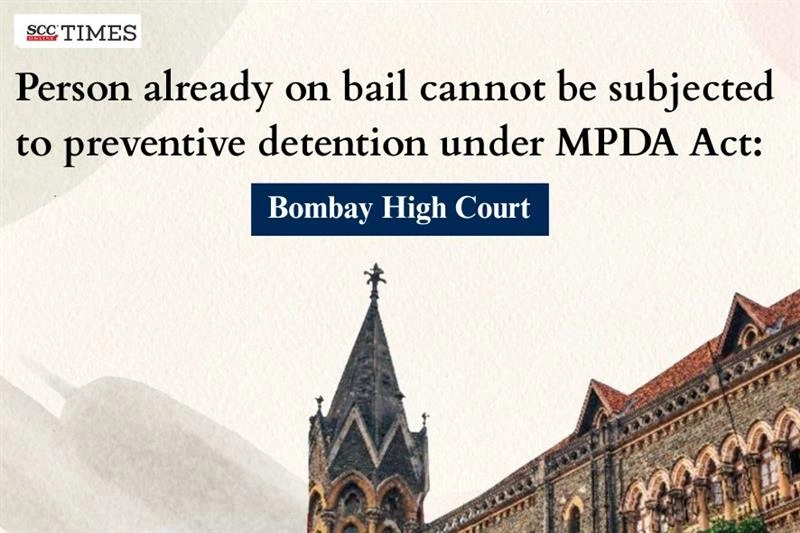Bombay High Court: In a writ petition filed under Article 226 of the Constitution challenging a preventive detention order under the Maharashtra Prevention of Dangerous Activities Act, 1981 (‘MPDA Act’), the Division Bench of M.S. Karnik* and Ajit B. Kadethankar, JJ., while quashing the detention order held that the Detaining Authority failed to consider the bail conditions imposed by the jurisdictional court and that preventive detention on the same charges was not the proper remedy. The Court highlighted that the in-camera statements relied upon were recorded prior to the enlargement of the petitioner on bail, and there was nothing on record to indicate that after being released on bail, the petitioner indulged in any criminal activities.
Background:
The matter originated from a proposal submitted on 10-03-2025 by the Senior Inspector of Police, Salgarwasti Police Station, Solapur, seeking detention under the MPDA Act. Acting upon this proposal, the Police Commissioner scrutinised the material and was subjectively satisfied that the activities of the detenu were prejudicial to the maintenance of public order. A detention order was issued on 14-04-2025, served the same day, and subsequently approved and confirmed by the State Government.
The record included four in-camera witness statements verified by the Assistant Commissioner of Police, Division-2, Solapur, between 25-02-2025 and 06-03-2025. These statements revealed that the detenu was engaged in illegal refilling of domestic LPG cylinders into auto rickshaws for undue economic gain, in contravention of Sections 3 and 7 of the Essential Commodities Act, 1955 (‘the Act of 1955’). The State submitted that such activities adversely affected auto rickshaw drivers, local people, shopkeepers, customers, passersby, and the general public. It was further contended that the detenu had been indulging in criminal activities since 2023, with two serious offences registered against him, preventive action taken in 2024 under Section 129 of the Bhartiya Nagarik Suraksha Sanhita, 2023 (‘BNSS’), and two more offences committed in 2025.
On behalf of the petitioner, it was argued that the detention order was vitiated as the Detaining Authority failed to consider the bail conditions imposed by the jurisdictional court on 07-03-2025. It was submitted that after release on bail, no prejudicial activities were recorded, and if at all the detenu engaged in similar activities, the proper remedy was cancellation of bail rather than preventive detention.
Analysis and Decision:
The Court noted from the detention order that the Police Commissioner relied upon in-camera statements of the witnesses, from which he formed an opinion that the petitioner’s activities in relation to those incidents were prejudicial to the maintenance of supplies of commodities essential to the community, namely the supply of domestic LPG cylinders, which adversely affected the maintenance of public order.
The Court observed that the Police Commissioner further relied on the criminal case registered with Salgar Wasti Police Station under Sections 287 and 288 of the Bhartiya Nyaya Sanhita, 2023 read with Sections 3 and 7 of the Act of 1955. The Court highlighted that the Police Commissioner observed that the petitioner was a free person and, considering his propensity towards criminality, there was an imminent possibility of him reverting to similar activities prejudicial to the maintenance of supplies of essential commodities, thereby affecting public order in the future.
The Court referred to the decision in Joyi Kitty Joseph v. Union of India, (2025) 4 SCC 476, wherein it was held that the law of preventive detention is a hard law and therefore it should be strictly construed. The Court emphasised that the Police Commissioner did not consider the efficacy of the conditions imposed by the jurisdictional Court while enlarging the petitioner on bail, nor entered any satisfaction, however subjective, as to those conditions being insufficient to restrain the petitioner from indulging in such activities.
The Court noted that in light of the law laid down by the Supreme Court, when a person is enlarged on bail by a competent criminal court, great caution must be exercised in scrutinising the validity of an order of preventive detention based on the very same charge which is to be tried by the criminal court. The Court highlighted that the in-camera statements relied upon were recorded prior to the enlargement of the petitioner on bail, and there was nothing on record to indicate that after being released on bail, the petitioner indulged in any criminal activities or that the prosecution had moved for cancellation of bail.
The Court consequently held that when bail was granted by the jurisdictional Court, that too on conditions, the Police Commissioner ought to have examined whether those conditions were sufficient to curb the evil of further indulgence in identical activities, which formed the basis of the preventive detention order. The Court further emphasised that the State is not without a remedy, and in case the petitioner was truly a menace to society, the prosecution could have sought cancellation of bail or moved an appeal before a higher court. However, the Court observed that seeking shelter under the preventive detention law was not the proper remedy in the facts and circumstances of the present case.
The Court, therefore, quashed the detention order and directed the petitioner’s immediate release.
[Haridas Shankar Gaikwad v. State of Maharashtra, 2025 SCC OnLine Bom 4349, 11-11-2025]
*Judgment authored by: Justice M.S. Karnik
Advocates who appeared in this case:
For the Petitioner: Jayashree Tripathi
For the Respondent: S.N. Deshmukh, A.P.P


